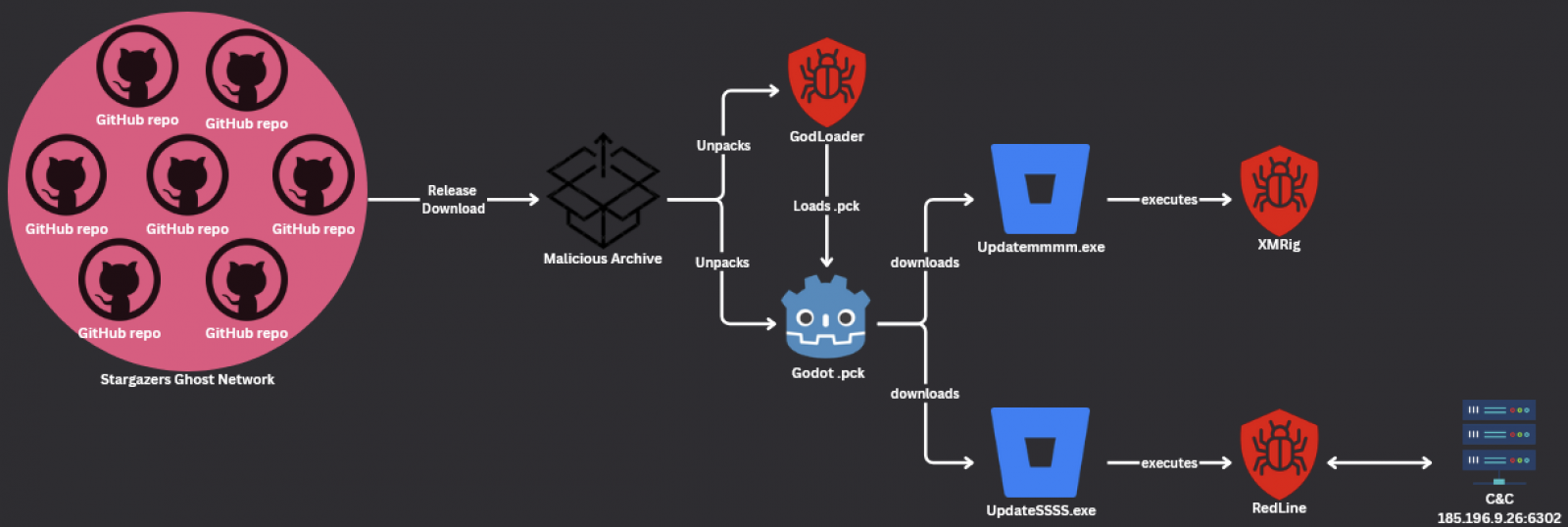Hackers abuse popular Godot game engine to infect thousands of PCs
by nlqip

Hackers have used new GodLoader malware exploiting the capabilities of the widely used Godot game engine to evade detection and infect over 17,000 systems in just three months.
As Check Point Research found while investigating the attacks, threat actors can use this malware loader to target gamers across all major platforms, including Windows, macOS, Linux, Android, and iOS.
It’s also used to leverage Godot’s flexibility and its GDScript scripting language capabilities to execute arbitrary code and bypass detection systems using the game engine .pck files, which package game assets, to embed harmful scripts.
Once loaded, the maliciously crafted files trigger malicious code on the victims’ devices, enabling attackers to steal credentials or download additional payloads, including the XMRig crypto miner. This miner malware’s configuration was hosted on a private Pastebin file uploaded in May, which was visited 206,913 times throughout the campaign.
“Since at least June 29, 2024, cybercriminals have been taking advantage of Godot Engine to execute crafted GDScript code which triggers malicious commands and delivers malware. This technique has remained undetected by most antivirus tools on VirusTotal, possibly infecting more than 17,000 machines in just a few months,” according to Check Point.
“Godot has a vibrant and growing community of developers who value its open-source nature and powerful capabilities. Over 2,700 developers contributed to the Godot gaming engine,” while “on platforms like Discord, YouTube, and other social media platforms, the Godot engine has around 80,000 followers who stay updated on the latest news.”

The attackers delivered the GodLoader malware through the Stargazers Ghost Network, a malware Distribution-as-a-Service (DaaS) that masks its activities using seemingly legitimate GitHub repositories.
Between September and October 2024, they used over 200 repositories controlled by over 225 Stargazer Ghost accounts to deploy the malware to targets’ systems, exploiting potential victims’ trust in open-source platforms and seemingly legitimate software repositories.
Throughout the campaign, Check Point detected four separate attack waves against developers and gamers between September 12 and October 3, enticing them to download infected tools and games.
While the security researchers only discovered GodLoader samples targeting Windows systems, they also developed GDScript proof-of-concept exploit code showing how easily the malware can be adapted to attack Linux and macOS systems.
Stargazer Goblin, the threat actor behind the Stargazers Ghost Network DaaS platform used in these attacks, was first observed by Check Point promoting this malware distribution service on the dark web in June 2023. However, it has likely been active since at least August 2022, earning over $100,000 since this service was launched.
The Stargazers Ghost Network uses over 3,000 GitHub “ghost” accounts to create networks of hundreds of repositories that can be used to deliver malware (mainly information stealers like RedLine, Lumma Stealer, Rhadamanthys, RisePro, and Atlantida Stealer) and star, fork, and subscribe to these malicious repos to push them to GitHub’s trending section and increase their apparent legitimacy.
Source link
lol
Hackers have used new GodLoader malware exploiting the capabilities of the widely used Godot game engine to evade detection and infect over 17,000 systems in just three months. As Check Point Research found while investigating the attacks, threat actors can use this malware loader to target gamers across all major platforms, including Windows, macOS, Linux,…
Recent Posts
- Seven Trends to Watch for in 2025
- Multiple Vulnerabilities in Ivanti Products Could Allow for Remote Code Execution
- Ivanti Releases Security Updates for Connect Secure, Policy Secure, and ZTA Gateways | CISA
- CISA Adds One Vulnerability to the KEV Catalog | CISA
- CVE-2025-0282: Ivanti Connect Secure Zero-Day Vulnerability Exploited In The Wild
